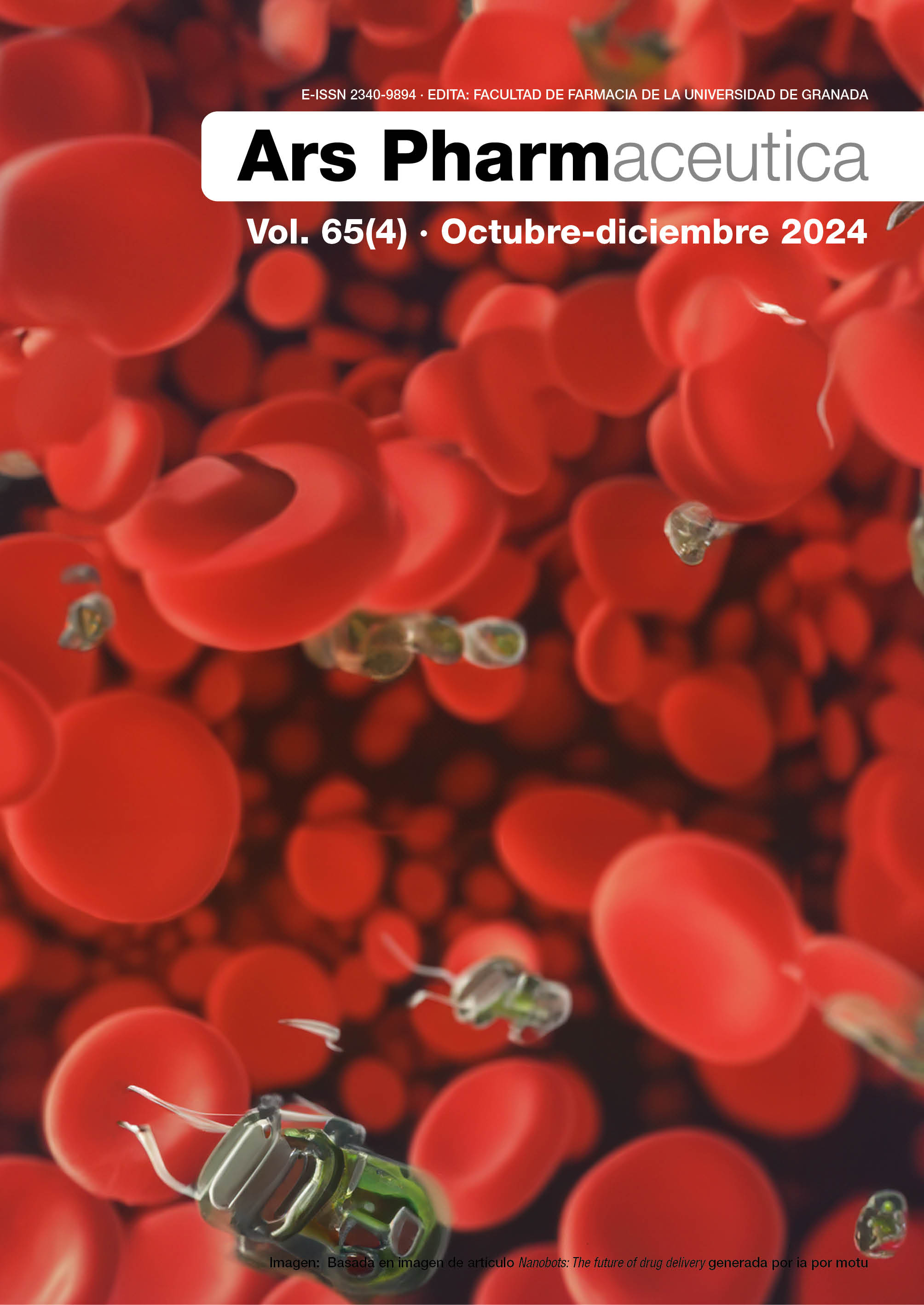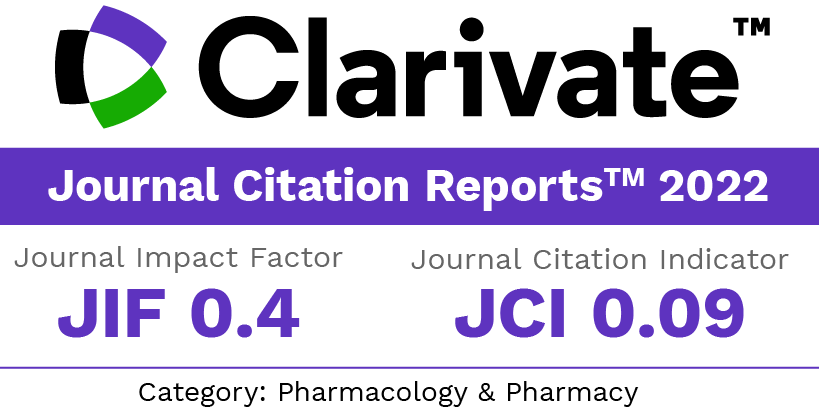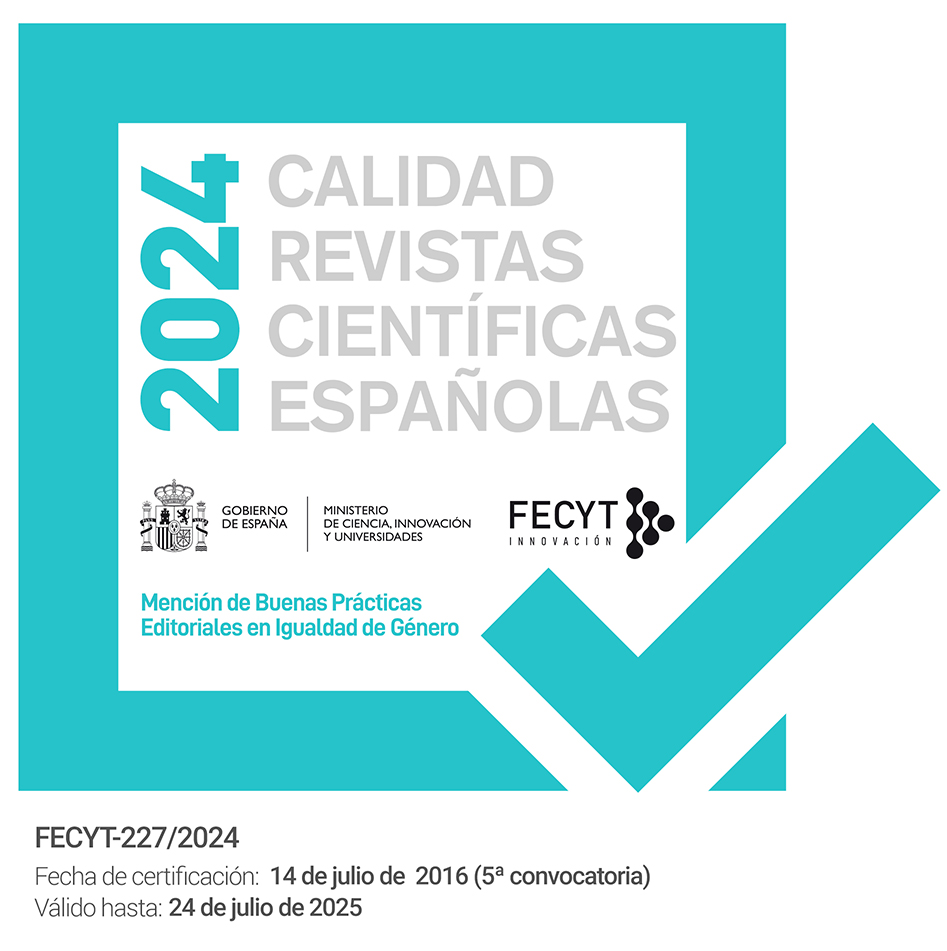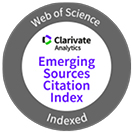Knowledge about the process of use of antihypertensive medications and its relationship with adherence
DOI:
https://doi.org/10.30827/ars.v65i4.29993Keywords:
Antihypertensive agents, Community Pharmacy Services; Electronic Prescription; High blood pressure; Treatment Adherence; Pharmaceutical Services; Pharmacies., Medication Adherence, Patient Medication Knowledge, Patient medication knowledge; Antihypertensive agents; Treatment Adherence and Compliance., Treatment Adherence and ComplianceAbstract
Introduction: Adherence to antihypertensive medication (Adh-MHBP) is influenced by the patient’s knowledge about high blood pressure (HBP) and the medications prescribed to treat it. Few studies have evaluated how patient knowledge influences the process of using antihypertensive medications (CUMA) in Adh-MHBP. The objective was to evaluate the relationship between CUMA and Adh-MHBP, and to propose a questionnaire to measure CUMA (CUMA-Q).
Method: A cross-sectional descriptive observational study was carried out on 95 patients who came to pick up their antihypertensive medication (MHBP) at 5 community pharmacies in the metropolitan area of Granada (Spain). The percentage of adherence to MHTA (%Adh-MHBP) was calculated based on the dispensing record of the electronic prescription system (SPE) of the Andalusian Health System (SAS). A multivariate logistic regression was performed to study the relationship between CUMA and Adh-MHBP. The validity and reliability of CUMA-Q was studied.
Results: 95 patients were included (56.8 % women). The mean age was 68.1 (SD: 10.0) years. Only 17.9% had a BMI <25kg/m2. Considering a minimum %Adh-MBHP of 80 %, 30.5 % were non-adherent. The multivariate analysis showed that there was a greater risk of being non-adherent if the process of using the medication is not known in a statistically significant way.
Conclusions: This study shows that if the patient knows how to identify their MHTA and knows the prescribed dosage and guidelines, it is more likely that their adherence to said medication will be adequate. The CUMA-Q presented acceptable psychometric properties in the sample studied.
Downloads
References
Williams B, Mancia G, Spiering W, Agabiti Rosei E, Azizi M, Burnier M, et al. 2018 ESC/ESH Guidelines for the management of arterial hypertension. Eur Heart J. 2018; 39(33):3021-3104. DOI: 10.1093/eurheartj/ehy339 DOI: https://doi.org/10.1093/eurheartj/ehy339
Carey RM, Muntner P, Bosworth HB, Whelton PK. Prevention and Control of Hypertension: JACC Health Promotion Series. J Am Coll Cardiol. 2018; 72(11):1278-1293. DOI: 10.1016/j.jacc.2018.07.008 DOI: https://doi.org/10.1016/j.jacc.2018.07.008
Worldwide trends in hypertension prevalence and progress in treatment and control from 1990 to 2019: a pooled analysis of 1201 population-representative studies with 104 million participants. Lancet 2021; 398:957–980. DOI: 10.1016/S0140-6736(21)01330-1 DOI: https://doi.org/10.1016/S0140-6736(21)01330-1
Menéndez E, Delgado E, Fernández-Vega F, Prieto MA, Bordiú E, Calle A, et al. Prevalence, Diagnosis, Treatment, and Control of Hypertension in Spain. Results of the Di@bet.es Study. Rev Espanola Cardiol Engl Ed. 2016; 69(6):572-578. DOI: 10.1016/j.rec.2015.11.034 DOI: https://doi.org/10.1016/j.rec.2015.11.034
Kingston A, Comas-Herrera A, Jagger C, MODEM project Forecasting the care needs of the older population in England over the next 20 years: estimates from the population ageing and care simulation (PACSim) modelling study. Lancet Public Health 2018; 3:e447–55. DOI: 10.1016/S2468-2667(18)30118-X DOI: https://doi.org/10.1016/S2468-2667(18)30118-X
Whitworth JA, World Health Organization, International Society of Hypertension Writing Group. 2003 World Health Organization (WHO)/International Society of Hypertension (ISH) statement on management of hypertension. J Hypertens. 2003; 21(11):1983-1992. DOI: 10.1097/00004872-200311000-00002 DOI: https://doi.org/10.1097/00004872-200311000-00002
Baena-Díez JM, Gómez-Fernández C, Vilató-García M, Vásquez-Lazo EJ, Byram AO, Vidal-Solsona M. [A prescription register incorporated into computerized medical records for patients with hypertension: a new instrument to evaluate medication adherence]. Aten Primaria. 2011; 43(7):336-342. DOI: 10.1016/j.aprim.2010.04.018 DOI: https://doi.org/10.1016/j.aprim.2010.04.018
Poulter NR, Borghi C, Parati G, Pathak A, Toli D, Williams B, et al. Medication adherence in hypertension. J Hypertens. 2020; 38(4):579-587. DOI: 10.1097/HJH.0000000000002294 DOI: https://doi.org/10.1097/HJH.0000000000002294
Buitrago F. Therapeutic adherence. How difficult it is to comply!. Atencion Primaria Soc Esp Med Fam Comunitaria. 2011; 43(7):343-344. DOI: 10.1016/j.aprim.2011.05.002 DOI: https://doi.org/10.1016/j.aprim.2011.05.002
Gadkari AS, McHorney CA. Unintentional non-adherence to chronic prescription medications: how unintentional is it really? BMC Health Serv Res. 2012; 12:98. DOI: 10.1186/1472-6963-12-98 DOI: https://doi.org/10.1186/1472-6963-12-98
AlGhurair SA, Hughes CA, Simpson SH, Guirguis LM. A systematic review of patient self-reported barriers of adherence to antihypertensive medications using the world health organization multidimensional adherence model. J Clin Hypertens Greenwich Conn. 2012; 14(12):877-886. DOI: 10.1111/j.1751-7176.2012.00699.x DOI: https://doi.org/10.1111/j.1751-7176.2012.00699.x
Paczkowska A, Hoffmann K, Kus K, Kopciuch D, Zaprutko T, Ratajczak P, et al. Impact of patient knowledge on hypertension treatment adherence and efficacy: A single-centre study in Poland. Int J Med Sci. 2021; 18(3):852-60. DOI: 10.7150/ijms.48139 DOI: https://doi.org/10.7150/ijms.48139
Mårdby AC, Akerlind I, Jörgensen T. Beliefs about medicines and self-reported adherence among pharmacy clients. Patient Educ Couns. 2007; 69(1-3):158-164. DOI: 10.1016/j.pec.2007.08.011 DOI: https://doi.org/10.1016/j.pec.2007.08.011
Jankowska-Polanska B, Uchmanowicz I, Chudiak A, Dudek K, Morisky DE, Szymanska-Chabowska A. Psychometric properties of the Polish version of the eight-item Morisky Medication Adherence Scale in hypertensive adults. Patient Prefer Adherence. 2016; 10: 1759-1766. DOI: 10.2147/PPA.S101904 DOI: https://doi.org/10.2147/PPA.S101904
Ghembaza MA, Senoussaoui Y, Tani M, Meguenni K. Impact of Patient Knowledge of Hypertension Complications on Adherence to Antihypertensive Therapy. Curr Hypertens Rev. 2014; 10(1):41-8. DOI: 10.2174/157340211001141111160653 DOI: https://doi.org/10.2174/157340211001141111160653
Fanelli E, Ravetto Enri L, Pappaccogli M, Fasano C, Di Monaco S, Pignata I, et al. Knowledge on arterial hypertension in general population: Results from a community pharmacy screening program. Nutr Metab Cardiovasc Dis. 2021; 31(4):1081-1086. DOI: 10.1016/j.numecd.2021.01.004 DOI: https://doi.org/10.1016/j.numecd.2021.01.004
Zheng F, Ding S, Luo A, Zhong Z, Duan Y, Shen Z. Medication literacy status of outpatients in ambulatory care settings in Changsha, China. J Int Med Res. 2017; 45(1):303-309. DOI: 10.1177/0300060516676726 DOI: https://doi.org/10.1177/0300060516676726
Zhong Z, Zheng F, Guo Y, Luo A. Medication Literacy in a Cohort of Chinese Patients Discharged with Acute Coronary Syndrome. Int J Environ Res Public Health. 2016; 13(7):720. DOI: 10.3390/ijerph13070720 DOI: https://doi.org/10.3390/ijerph13070720
Cordina M, Hämeen-Anttila K, Lauri J, Tabone S, Enlund H. Health and medication literacy and the desire to participate in pharmacotherapy decision making - comparison of two countries. Res Soc Adm Pharm RSAP. 2018; 14(9):817-823. DOI: 10.1016/j.sapharm.2018.06.009 DOI: https://doi.org/10.1016/j.sapharm.2018.06.009
Gavrilova A, Bandere D, Rutkovska I, Šmits D, Mauriņa B, Poplavska E, et al. Knowledge about Disease, Medication Therapy, and Related Medication Adherence Levels among Patients with Hypertension. Med Kaunas Lith. 2019; 55(11). DOI: 10.3390/medicina55110715 DOI: https://doi.org/10.3390/medicina55110715
Karaeren H, Yokuşoğlu M, Uzun S, Baysan O, Köz C, Kara B, et al. The effect of the content of the knowledge on adherence to medication in hypertensive patients. Anadolu Kardiyol Derg AKD Anatol J Cardiol. 2009; 9(3):183-188. PMID: 19520651
Amado Guirado E, Pujol Ribera E, Pacheco Huergo V, Borras JM; ADIEHTA Group. Knowledge and adherence to antihypertensive therapy in primary care: results of a randomized trial. Gac Sanit. 2011; 25(1):62-7. DOI: 10.1016/j.gaceta.2010.09.015. DOI: https://doi.org/10.1016/j.gaceta.2010.09.015
Márquez-Contreras E, López García-Ramos L de, Martell-Claros N, Gil-Guillen VF, Márquez-Rivero S, Pérez-López E, et al. Validation of the electronic prescription as a method for measuring treatment adherence in hypertension. Patient Educ Couns. 2018; 101(9):1654-1660. DOI: 10.1016/j.pec.2018.04.009 DOI: https://doi.org/10.1016/j.pec.2018.04.009
Prieto-Merino D, Mulick A, Armstrong C, Hoult H, Fawcett S, Eliasson L et al. Estimating proportion of days covered (PDC) using real-world online medicine suppliers’ datasets. J Pharm Policy Pract. 2021;14(1):113. doi: 10.1186/s40545-021-00385-w. DOI: https://doi.org/10.1186/s40545-021-00385-w
Krousel-Wood M, Islam T, Webber LS, Re RN, Morisky DE, Muntner P. New medication adherence scale versus pharmacy fill rates in seniors with hypertension. Am J Manag Care. 2009; 15(1):59-66. PMCID: PMC2728593
Nunally, J.C., Bernstein, I.H. Psychometric Theory. United States of América: McGraw-Hill; 1994.
Ayodapo AO, Elegbede OT, Omosanya OE, Monsudi KF. Patient Education and Medication Adherence among Hypertensives in a Tertiary Hospital, South Western Nigeria. Ethiop J Health Sci. 2020; 30(2):243-250. DOI: 10.4314/ejhs.v30i2.12 DOI: https://doi.org/10.4314/ejhs.v30i2.12
Shi S, Shen Z, Duan Y, Ding S, Zhong Z. Association Between Medication Literacy and Medication Adherence Among Patients With Hypertension. Front Pharmacol. 2019; 10:822. DOI: 10.3389/fphar.2019.00822 DOI: https://doi.org/10.3389/fphar.2019.00822
Martínez González MA, Sánchez-Villegas A, Faulín Fajardo J. Bioestadística amigable. Madrid (España): Diaz de Santos; 2009. 936 p.
Downloads
Published
How to Cite
Issue
Section
License
Copyright (c) 2024 Elisa Isabel Pareja Martínez, Elisabeth Esquivel-Prados, Fernando Martínez Martínez, Jose Pedro García-Corpas

This work is licensed under a Creative Commons Attribution-NonCommercial-ShareAlike 4.0 International License.
The articles, which are published in this journal, are subject to the following terms in relation to the rights of patrimonial or exploitation:
- The authors will keep their copyright and guarantee to the journal the right of first publication of their work, which will be distributed with a Creative Commons BY-NC-SA 4.0 license that allows third parties to reuse the work whenever its author, quote the original source and do not make commercial use of it.
b. The authors may adopt other non-exclusive licensing agreements for the distribution of the published version of the work (e.g., deposit it in an institutional telematic file or publish it in a monographic volume) provided that the original source of its publication is indicated.
c. Authors are allowed and advised to disseminate their work through the Internet (e.g. in institutional repositories or on their website) before and during the submission process, which can produce interesting exchanges and increase citations of the published work. (See The effect of open access).























